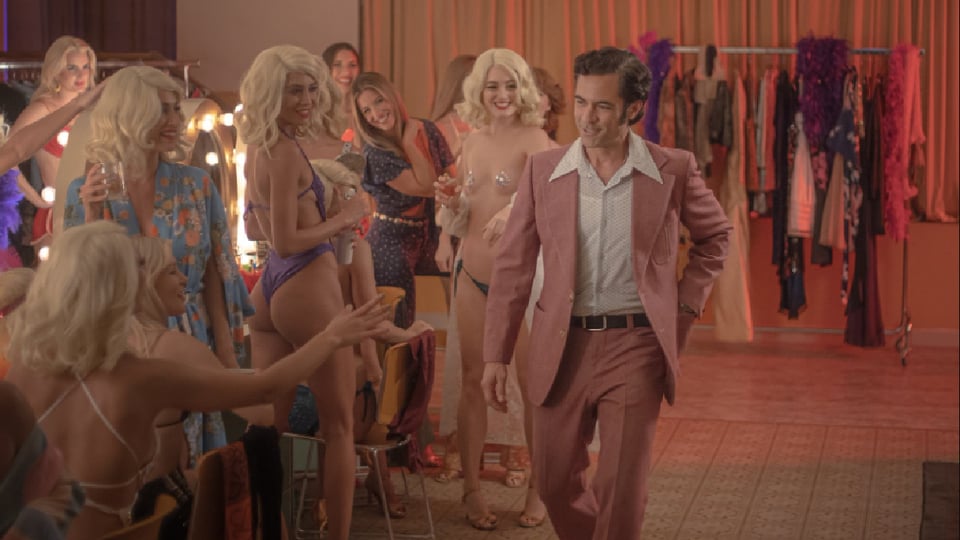Should you check into Hotel Cocaine?
the true crime that's worth your time

Best Evidence supporters get every review and article sent straight to their inbox. To read for free, click on through.
It’s a bitch getting old. As a person born at the dawn of the 1970s, I’m suddenly more understanding of why my parents turned their noses up at Happy Days for its lack of authenticity, as well as how it papered over the more problematic aspects of 1950s culture.* To its credit, Hotel Cocaine, a MGM+ drama about real life hotel manager/drug family member/CIA informant Roman Compte and Miami’s infamous Mutiny Hotel, doesn’t ignore the troubling aspects of life in disco-era Florida. But it also struggles with tone in a way that’s becoming more and more familiar with darker-themed shows that end up on less prominent streamers. It’s never brutal and harsh enough to feel terribly accurate, it’s never glamorous enough to be dirty fun, and there’s a tiresome sense of dutiful responsibility to how its main character is portrayed. It’s not the fish of Miami Vice, nor is it the fowl of Scarface.
The closest cognate I can think of is Casino, another dramatic adaptation of the life of a crime-linked hotelier with a stunning set of side characters who revolve around a fairly staid central figure. But imagine if Casino was a TV series, cast with TV actors and on a TV budget. Now you’re getting there.
Creator Chris Brancato has done this sort of thing before, and done it better. The first season of his Netflix series, Narcos, had all the kinetic energy and ferocity that I was hoping for with Hotel Cocaine. It’s hard not to wonder if the struggles the streaming industry has seen since Narcos‘ glory days of 2015 have some hand in Hotel Cocaine‘s disparity in vim, vigor, and quality.
It’s too bad, because Compte and the Mutiny deserve the full Casino (or even Narcos) treatment, and they’re not getting it here. Burton Goldberg, the man who owned the Mutiny, was known as the Hugh Hefner of Florida, hosting rock bands and the biggest celebs of the era in an impossibly glossy and glamorous velvet-roped hotel. (That’s just part of his life, check out this dude’s obit.) This legit 1970s party monster has been renamed Burton Greenberg for Hotel Cocaine, where he’s portrayed by a permed wig attached to TV standby Mark Feuerstein.
The always likable Feuerstein is joined in the cast by other likable, generally inoffensive folks you also know mainly from TV. The cuddly Yul Vazquez plays ostensibly terrifying (but he’s not, because it’s Yul Vazquez) drug lord Nestor Cabal, who was not a real person. Another network standby, John Ventimiglia, plays Hunter S. Thompson, who was (but wasn’t much like this, proving it takes more than a patterned shirt and a pair of glasses to be gonzo).
Danny Pino, another wildly likable TV actor (think every procedural ever), plays Compte. He does his able best — better than the show deserves, maybe — but he’s a snooze in the role, even when he’s literally shooting a guy in the face. Michael Chiklis revives his The Shield vibes to play a CIA guy who puts the screws to Compte, and arguably shows up with the most energy. But even his characterization makes you wish some of the lines seen snorted on the screen were available for the tooting.
The women in this show are side dishes, at best, either providing the men with helpful advice or requesting some sort of rescue. While I was watching the series, I found myself hustling to forgive this — after all, women were indeed marginalized in the drug trade, so a lack of inclusion is historically accurate, sure. It’s not like Roben Farzad’s 2017 book on the era, Hotel Scarface: Where Cocaine Cowboys Partied and Plotted to Control Miami, centered women in its nonfictional narrative. (It’s definitely worth a read, especially as Amazon has used paperback copies for around five bucks.)
But the show takes so many liberties with historical accuracy already — it gives Compte a made-up coke kingpin brother, for pete’s sake. Would weaving in a self-sustaining woman be that much to ask? (If Dune could do it…)
Farzad’s book spurred a wave of coverage including this Post report on the Mutiny, which I suspect was in the research packet Hotel Cocaine. When you read that 2017 tabloid piece, you feel the energy of the place, and can see why the scene felt like fodder for a fantastic adaptation. The thrilling set of characters, the volatility, the Boogie Nightsness of it all. This Miami New Times oral history of the Mutiny, which seems inspired in part by journalist Owen Band’s irritation with Hotel Cocaine‘s flaccidity, will also give you a sense of what could have been.
If you have MGM+ and are still burning to watch, you have my blessing — it’s not like the show is any more offensive than other depictions of the Cocaine Cowboy era have been. But some offensiveness might have helped Hotel Cocaine make more of an impact. But I’ll give you one last warning: for whatever reason, the streamer also decided that weekly episode drops were the way to go for this property, as opposed to dropping it on one full-season binge. Right now, only one ep is available to watch, with new ones every Sunday. Will you remember to check back into Hotel Cocaine after watching its first hour? I sincerely doubt it.
*And that’s how I ended up on the “Was there ever a Black Guy on Happy Days?” message board. The answer to the board’s question is as follows: “The guy’s [nickname] was ‘Sticks.’ But his real name was William Downey, Jr. He played in the episode ‘Fonzie’s New Friend.’ The episode were Richie throws a Hawaiian Party, but no one comes because Sticks will be there. Hope this helps.”
Add a comment: